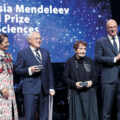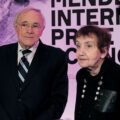Chemists Irina Beletskaya and Klaus Alexander Müllen received the UNESCO–Russia Mendeleev International Prize.
The scientists from Russia and Germany were awarded for their contribution to fundamental science and sustainable development goals. Their research opens up new opportunities in all sectors of industry, from agriculture to biomedicine.
The UNESCO–Russia Mendeleev International Prize was established to celebrate the 150th anniversary of the Mendeleev’s Periodic Table and is awarded to basic scientists in recognition of their breakthrough discoveries, promotion of scientific knowledge, contribution to socio-economic development and international cooperation. In 2021, the Prize was awarded for the first time at the UNESCO headquarters in Paris to Russian physicist Yuri Oganessian and Italian chemist Vincenzo Balzani.
In December 2023, the award ceremony took place at the Russian Academy of Sciences in Moscow. The prize was awarded to Irina Beletskaya, Professor of the Faculty of Chemistry of Moscow State University, Member of the Russian Academy of Sciences, and Professor Klaus Alexander Müllen, Director Emeritus of the Max Planck Institute for Polymer Research. The winners were selected by the international jury for outstanding scientific achievements and commitment to science education, enlightenment, and sustainable development goals.
Irina Beletskaya was recognized for innovative developments in the field of organic synthesis. They have a wide scope of application, from agriculture to drug manufacturing. Beletskaya took an active part in the fight against chemical weapons worldwide. In 1991–1993, she was chairman of the Organic Division of the International Union of Pure and Applied Chemistry (IUPAC) and then served on IUPAC’s Committee on Chemical Weapons Destruction Technology.
Klaus Alexander Müllen was recognized for outstanding achievements in fundamental chemical and polymer material sciences. The results of his research can also be applied in electronics, energy technologies, and biomedicine. Mullen is actively involved in educating the public and policymakers about scientific and technological opportunities and challenges. His famous lecture “Is the Future Black?” explores the significance of “black or transparent” carbon materials for further development of technology and economy.
The award ceremony took place at the Russian Academy of Sciences and was broadcast in the three official languages of UNESCO, Russian, English and French, for viewers in 50 countries around the world. The scale of the event reflected the critical role of science in the implementation of the UN Sustainable Development Goals.
The ceremony was attended by Dmitry Chernyshenko, Deputy Prime Minister, Valery Falkov, Minister of Science and Higher Education, Alexander Pankin, Deputy Minister of Foreign Minister of Russia, Gennady Krasnikov, President of the Russian Academy of Sciences, Viktor Sadovnichy, Rector of Moscow State University. The UNESCO was represented at the ceremony by Lydia Arthur Brito, UNESCO Assistant Director General for Natural Sciences.
Lidia Arthur Brito emphasized that the Mendeleev International Prize is the only global prize that rewards scientists for projects that foster UN Sustainable Development Goals. She quoted UN Secretary-General Antonio Guterres as saying, “Sustainable development represents hopes, dreams, rights, and expectations worldwide.”
Dmitry Chernyshenko added that addressing issues that are crucial for humanity is only possible through maintaining international cooperation free of political conditionality. Gennady Krasnikov said that the ceremony taking place at the Russian Academy of Sciences attests its importance as a platform for international cooperation. Viktor Sadovnichy noted that the recognition of scientific achievements regardless of nationality is the best proof that the international scientific community continues to be a bearer of universal human values, such as solidarity, progress, and humanism.
Irina Beletskaya thanked UNESCO for its support of basic sciences and organic chemistry in particular, which in public perception is often overshadowed by medicine, pharmaceutics, and space industry. “Organic chemistry is the key to environmentally safe production, affordable and effective medicine, and innovative materials,” Beletskaya said. “The fact that we now live longer and better is the result of many years of hard work of thousands of organic scientists. My award is a sign of gratitude to these people.”
Irina Beletskaya
Irina Beletskaya was born in Leningrad in 1933. She graduated from the Faculty of Chemistry of Moscow State University. Already at the age of 38, she received the title of Professor and was soon elected a corresponding member of the USSR Academy of Sciences. Since 1988, she heads the Laboratory of Organoelement Chemistry at Moscow State University. Professor Beletskaya’s most significant contribution to modern chemistry was arguably her 1995 discovery, along with Steven Buchwald and John Hartwig, of a novel method for synthesizing organic molecules crucial for bioactive compounds and drugs. Beletskaya was among the first chemists to demonstrate the great utility of rare earth elements in organic chemistry. She showed that some of their compounds can serve as catalysts in the agriculture, petrochemical, and pharmaceutical industries. Professor Beletskaya’s merits are recognized all over the world, and she a member of the editorial boards of several scientific journals, recipient of many international awards, and an honorary professor at universities in Sweden and Argentina.
Klaus Alexander Müllen
Klaus Müllen was born in Cologne, Germany, in 1947. He graduated from the University of Basel, Switzerland. From 1989 to 2016, he was director of the Max-Planck Institute for Polymer Research, and in 2016, he became emeritus. His research group designed novel conjugated molecules whose properties are important for the development of optoelectronic devices. In the future, this could lead to revolutionary breakthroughs in the field of information technology and other areas, for example, energy technologies and biomedicine. Professor Müllen has authored more than 2,000 scientific publications cited by tens of thousands of researchers. He was president of the German Chemical Society and the Society of German Natural Scientists and Physicians. Currently, Müllen is an honorary member of a number of scientific societies in the USA, China, and other countries. Over the past 20 years, he has given hundreds of lectures on most modern fields of chemistry and their social significance.


